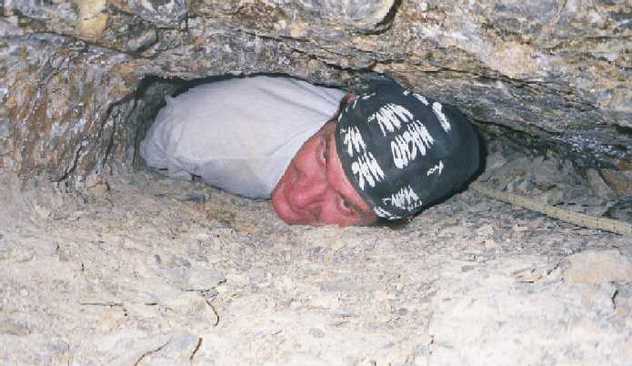 Misconceptions
Misconceptions  Misconceptions
Misconceptions  Crime
Crime 10 Incredible Big-Time Art Fraudsters
 Movies and TV
Movies and TV 10 Most Influential Fictional Objects in Cinema History
 Our World
Our World Top 10 Real Almost‑Cities That Never Materialized
 Technology
Technology 10 Unsettling Ways Big Brother Is (Likely) Spying on You
 Music
Music 10 Chance Encounters That Formed Legendary Bands
 Space
Space 10 Asteroids That Sneaked Closer Than Our Satellites
 Sport
Sport The 10 Least Credible Superstars in Professional Sports
 Animals
Animals 10 Strange Times When Species Evolved Backward
 Facts
Facts Ten Unexpectedly Fascinating Facts About Rain
 Misconceptions
Misconceptions 10 Widespread Historical Myths and the Texts That Started Them
 Crime
Crime 10 Incredible Big-Time Art Fraudsters
 Movies and TV
Movies and TV 10 Most Influential Fictional Objects in Cinema History
Who's Behind Listverse?

Jamie Frater
Head Editor
Jamie founded Listverse due to an insatiable desire to share fascinating, obscure, and bizarre facts. He has been a guest speaker on numerous national radio and television stations and is a five time published author.
More About Us Our World
Our World Top 10 Real Almost‑Cities That Never Materialized
 Technology
Technology 10 Unsettling Ways Big Brother Is (Likely) Spying on You
 Music
Music 10 Chance Encounters That Formed Legendary Bands
 Space
Space 10 Asteroids That Sneaked Closer Than Our Satellites
 Sport
Sport The 10 Least Credible Superstars in Professional Sports
 Animals
Animals 10 Strange Times When Species Evolved Backward
 Facts
Facts Ten Unexpectedly Fascinating Facts About Rain
10 Creepy Internet Stories That Are Disturbingly Believable
We all love it when the Internet tries to scare us, especially when it taps into our imagination and lets us do most of the work of scaring ourselves. Whether you call those stories “urban legends” or “creepypasta,” there is a quality to them that mainstream horror doesn’t quite provide.
10Broadcast Interruption
In Seneca, South Carolina, an unnamed viewer is channel surfing. He stops on a broadcast of one of his old teachers reading a poem on public television. As he watches, the teacher’s poem is interrupted by a cartoon, which features a typical, middle-class family on a typical day. It is drawn in an overly detailed but choppy style of the sort fashionable in America in the early ’90s.
As the family makes small talk, a broadcast comes on the radio about how mutations are occurring, flesh is melting, and monsters are emerging from the sea. The family ignores this, despite the fact a green light is coming in through the windows and their skin is becoming jaundiced. They go about their day, absorbing more and more of the green glow, which is making them more and more like mutant blobs. The cartoon ends with white text that reads “Report to the nearest shelter immediately. Remaining at private residences is strictly prohibited.” The date of November 17, 2017 is stated in the cartoon, giving the experience a sense of being prophetic. The author of this story is unknown, and the tale itself seems to have emerged sometime around 2011.
As bizarre as the cartoon and its predictions are, real life has shown it’s not as far-fetched as you might initially believe. After all, the American Broadcasting Channel, certainly a much bigger target than any public television channel, was once hacked by a man in a Max Headroom mask. The man left behind a much more cryptic message than the one featured in this story. And if this Seneca, South Carolina broadcast were real, it still wouldn’t be quite as gory as a network television broadcast called “A Short Vision” (from 1956, of all times). There has been some weird stuff broadcast over the nation’s airwaves, legitimately or otherwise.
Keep the lights on! Horror fans will love the terrifying short stories in Nightmare Machines at Amazon.com!
9Woman In The Oven
This story seems to date back to at least 2008. Unfortunately, the name of the original author is lost in the ether. Pity. Someone that can come up with such a bizarre and disturbing story and keep the tone so under control that it stays intriguing and believable deserves more credit.
In a mundane farm house, a woman is found burned to death in an oven. A camera is pointed at the oven, but there is no tape inside. However, a tape seemingly from the camera is discovered by a well behind the house. It shows the woman coming into the shot, setting the oven, climbing inside, and then closing the door after her. After some time, violent banging and shrieking happens inside the oven and smoke begins to emerge. But analysis of the woman in the video and the woman discovered in the oven concludes they are not the same person, based on height and stature. Cremating a human being takes two to three hours at 312 degrees Celsius (593 °F), so it can be reasonably assumed that a commercial stove would leave her sufficiently intact for such analysis. How any of this came to be is left for the readers to attempt to imagine in their nightmares.
8Barbie.avi
Dating back to at least August 9, 2009, Barbie.avi is the story of a young man who goes to a party in a largely abandoned industrial neighborhood. After being awoken early in the morning by something being thrown into a dumpster, he finds a discarded computer tower that he hopes to restore. Looking through the hard drive, he finds a video file labeled “Barbie.avi.” It’s a video of a woman apparently being interviewed, but it’s impossible to hear what she’s saying over the static. It seems the woman is being verbally abused, with “skin” being the only word the protagonist thinks he can read on her lips.
After 40 minutes of watching, he’s convinced something horrible happened to her. In a shot lasting a few seconds at the end of the video, there’s an abandoned home near some railroad tracks a few miles away. He and a friend go to investigate. They don’t find any trace of the woman in the building. However, more significantly, they do realize that there is running water at this decrepit house out in the middle of nowhere. What could have been covered up?
As hard as it is to believe that people might leave evidence of a murder on their computers before carelessly throwing them out, there are cases of people apparently being even more actively self-destructive with their murder evidence. For example, on Thanksgiving in 2012, a man in Little Falls, Minnesota outfitted his house with a large array of cameras and microphones to capture him tormenting and then murdering two young people that broke into his house. Barbie.avi with its ambiguity and subtlety is actually much more believable than real incidents like that.
7Sudden Onset
Author theLittleFears is one of those horror writers who really know how to use novel terrors from real life to enhance a horrifying story’s effect. Sudden Onset’s story is simplicity itself. A 14-year-old boy with strep throat participates in a “Bloody Mary” ritual during a sleepover. He and his friends gather in front of a mirror, turn the lights off, and then say “Bloody Mary” into the mirror three times, hoping that a ghost will appear. We don’t know what happens during the ritual, but we are told the aftermath is that the boy is now afraid of mirrors, feels fingers brushing against him at all times, and consequently lives a life of fear.
What allows this to transcend being a regular spook show is that theLittleFears explains that the boy was diagnosed with pediatric autoimmune neuropsychiatric disorder—a real condition where children with strep throat suddenly begin to have horrible hallucinations. Thus, this creepypasta straddles the line between the horrors of fact and fiction (and paranormal and normal) to an unusual degree. Does it really matter if there’s actually no ghost of “Bloody Mary” haunting you when your nerves keep telling you she’s got you in her fingers anyway?
6Dear Abby
Kyle Mangione-Smith’s story from 2012 is about a guy’s descent into madness, and how he mistakes obsession for love. It’s told as a series of letters that a grocery store employee writes to “Abby.” He goes from stealing surveillance tapes of her to breaking into her apartment and destroying photos of her boyfriend. His final stroke is to kidnap her, shortly after she’s gone to the police and starts packing up to move out. The man locks himself, Abby, and a knife inside a rented storage garage. As he lays dying, he is comforted to know that whether she kills herself or dies of dehydration, they’ll be together in death in a way they would never have had the chance of being in life.
While it’s an elaborate and cruel way to kill someone, it’s not much more horrifying than the real story of Roger Troy. Roger stalked and murdered Alissa Blanton in 2010, because he’d become obsessed with her while she was a Hooters server. Such are the threats that could enter an attractive person’s life at any time through no fault of their own.
5Burial On Box Hill
TheLittleFears returns to this list with a story that takes curious but real historical facts and asks a rather creepy question. The first section is about historical novelty deaths, like Jim Fixx—the man who popularized jogging—dying while jogging in 1894. The story seems to be included to get the audience’s defenses down. The history lesson then transitions to the unusual life and the even more unusual burial of Major Peter Labelliere. Labelliere was buried in a grave 100 meters (330 ft) deep, facing downward, and he insisted that children should dance on his grave. He is also said to have prophesied his own death and had his coffin sprinkled with twigs and leaves that were traditionally used to aid the transition to the afterlife.
After Peter Labelliere’s odd passing, the story describes the burial arrangements for American general Anthony Wayne, known by the nickname “Mad Anthony.” TheLittleFears mentions that both men were present at the obscure Battle of Paoli, then informs us that Anthony Wayne’s bizarre funeral and burial arrangements called for his bones to be removed and for him to be buried in two parts. She concludes by asking us what these two figures saw at the Battle of Paoli that forced them to arrange burials that would prevent them from ever returning to life.
4Ickbarr Bigelsteine
Written by Stephan D. Harris in 2012 (apparently a bumper year for Internet horror stories), this tale is about a kid using an imaginary friend to keep the darkness at bay. The imaginary friend is a sock puppet–like being that the child sews himself—at best an ugly-cute creation that you would expect a six-year-old to be able to make. It does keep the darkness at bay, until the day the kid loses his first tooth. His doll says he wants it, and the kid is happy to oblige. Apparently, Ickbarr Bigelsteine is very fond of the teeth. He wants the kid to keep providing them. When the kid runs out of his own teeth, he has to get more if he doesn’t want Bigelsteine to bring him into a nightmarish world.
Seemingly about a person suffering from schizophrenia, the story has an especially unpleasant resonance for many parents. This is because children with imaginary friends often say things their parents really don’t want to hear. Yet they should definitely pay attention to what their children say. Take January Schofield, who claimed that her imaginary friends—“400 the Cat” and “Wednesday the Rat”—were telling her to kill the family dog and to jump from buildings. Ickbarr Bigelsteine and his equivalents aren’t real, but the danger they represent is.
Read more creepy horror stories in the Kindle version of Disequilibria (A Book of Horror Stories) at Amazon.com!
3The Red Army
The Red Army is a story of the Russo-Finnish front during World War II. Actually, logically it should be a story of the Winter War of 1939–1940. Despite the opening line saying it happened in 1942, the descriptions of the Soviet Army being repulsed by the Finns and the mentions of Finnish snipers (probably meaning figures like the remarkable Simo Hayha) make it clear the author meant to describe that war instead of World War II.
That pedantry aside, The Red Army is a brief but frightening anecdote of mass cannibalism. Finnish troops overrunning Soviet camps find them either abandoned or having skins hung inside them. Due to a food shortage, the Soviets apparently had no alternative but to resort to the ultimate taboo. The story is accompanied by a photo of what’s purported to be a Red soldier’s flesh, which is presumably all that remains of the man. However, soldiers inspecting the camps find that despite what they’ve been told, the food supplies are fine. Rumors also circulate about some creature stalking the forests.
Untrue as that story might be, there was in fact a considerable amount of cannibalism on the part of the Soviets during the war, although poor logistics were not the cause. It was among Soviet prisoners taken during the Nazi invasion. They were so horribly treated by their captors that only one in five survived imprisonment. SS Colonel Rudolf Hess described in his journal that cannibalism was not uncommon at a camp he visited. Hess claimed that he personally saw a body he was sure had been gutted for the purpose. Also, there was the city of Leningrad, where a million Russians died from combat, disease, and starvation during a 900-day siege. Declassified documents revealed that 260 people were arrested for cannibalism.
As for the creature stalking the forests, real Soviet forests actually had some rather frightening creatures doing rather horrifying things. For example, a spate of wolf attacks occurred in Kirovskaya Oblast in 1944. Children became primary targets, including a group of four girls that were attacked by a pack. With all those problems facing them, Soviet citizens probably would have come to consider a monster stalking the forests as merely another horrible fact of life.
2Ted The Caver

Dating back to 2001, Ted the Caver may be the first creepypasta the Internet has ever produced. It is certainly one of the longest and most exhaustively photographically detailed. Ted and his friend “B” (all names of persons and locations are said to be withheld) decide to explore a deliberately unidentified cave. They dig their way into a narrow opening, which they believe to be about 18 centimeters (7 in) tall—barely tall enough to crawl through. When they begin crawling into this narrow confine, they find hieroglyphics, hear strange noises, and feel the presence of something seemingly malignant. Much of this happens while they’re about as trapped and helpless as they can possibly be. The author writes and posts this account of what happened but then insists he feels compelled to return to the cave. That’s the last we hear from him.
Assuming that Ted and B are not dealing with anything supernatural in the story, real spelunkers have been known to have severe hallucinations. They are among the few people that often explore in absolute darkness and are exposed to other forms of sensory deprivation. As illustrated by the very uncomfortable photo taken by the story’s author, being all but trapped in rock is surely one of the most hellish times to experience hallucinations.
1Autopilot
In this popular story by Skarjo, a man deeply locked into his routine is thrown off a little by the fact that he forgot his cell phone. This distracts him on his way to work and to drop off his daughter at the daycare on a hot day. After a seemingly typical day at work, he drives home with a bad smell in the backseat—probably something spilled in the back and has spoiled in the heat. When he gets home, he realizes he forgot to pick up his daughter. But when he gets to the daycare, he finds he was too stuck on disrupted autopilot to notice that he didn’t drop his daughter off there. Gradually, he begins to understand what the bad smell coming from the backseat is. His autopilot disengages, probably never to engage in quite the same way ever again.
Autopilot is almost more of a tragedy than a horror story, but it’s certainly not a fanciful story by any means. There are numerous terrible stories of parents leaving their young children in vehicles. And it’s certainly not limited to negligent parents—a hospital administrator once forgot a child in the car seat, where she perished. As such, this story may just be the worst of all. It tells us that the most horrible things don’t happen because of mysterious malignant intent, psychopathy, or anything paranormal. They happen because we’re fallible human beings.
Dustin Koski also has a list of creepy stories in Listverse.com’s Epic Book of Mind-Boggling Lists.








